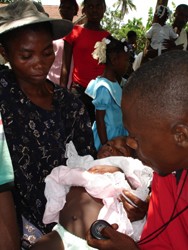
Juliette Luesée is a 21-month old girl from Poussière, a rural village in the county of Jeremie, southwest Haiti. She has pneumonia. It is her third bout of the illness since she was born.
This time, Juliette is being treated at one of 60 USAID-supported mobile medical clinics that make monthly visits to villages near Jeremie in an effort to curb the fatality rates for pneumonia-related deaths. Pneumonia is the second leading cause of death in Haiti among children under five. In southwest Haiti, USAID’s program has cut those rates in half.
The clinics provide basic primary health services to 200,000 people in Jeremie and surrounding villages. Services include vaccinations to prevent diseases like polio and measles; vitamin A to prevent blindness; examinations to detect malnutrition; treatment of diarrhea and malaria; pre-natal and post-childbirth consultations; and counseling on breastfeeding.
Many of those who suffer from pneumonia live far from medical care. Getting to the hospital can even be impossible. The only hospital near Poussière is in Jeremie, a two-hour drive by car on unpaved roads that become treacherous during the rainy season when the Grand’Anse River swells.
Juliette’s parents heard about the mobile clinic through a health agent in their village who advertised it via a megaphone. USAID-supported health agents are assigned to villages close to home so they can their target communities and can be reached twenty-four hours a day. They spread health messages and identify and treat illnesses or refer patients to doctors. Typically a health agent serves 1500 to 3000 people.
“My child is responding to the medicine — if a neighbor’s child is suffering I will tell them they must see the health agent who can help get medicines quickly,” says Françoise Israel, Juliette’s mother. Fortunately Juliette’s pneumonia was caught in time — with a trained worker and 25 cents of antibiotics, the baby was safe. Children who develop advanced pneumonia are often less fortunate — if they do not get to the hospital in time, they may not survive. With help from USAID, health agents are ensuring that many lives are saved with simple, inexpensive solutions.







Comment
Make a general inquiry or suggest an improvement.